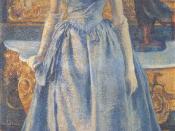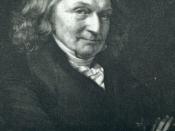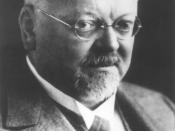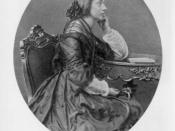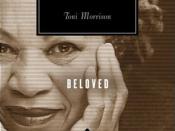A Murder of Selfish Love Would you call murdering your own child love? A mother's love for her child is so strong that some mothers might call this love. In Toni Morrison's Beloved, Sethe, a former slave woman and mother, chooses to kill her baby daughter rather than allowing her to be exposed to the horrors of a life spent in slavery. Sethe considers this to be love, but her actions are indisputable: she has killed her child. Sethe's motivation is not so clearly defined. By killing her defenseless child, has Sethe acted out of true love or selfish pride? The fact that Sethe's act is irrational can easily be decided upon. Does Sethe kill her baby girl because she wants to save the baby from slavery or does Sethe end her daughter's life because of a selfish refusal to return a life of slavery? She is a woman who chooses to love her children but not herself.
Even though Sethe's actions come from love for her children, they are also selfish because of her refusal to accept personal responsibility for her baby's death. Why would a mother commit an act so horrible because of her extreme love for her children and then not have enough love for them to take responsibility for the act? Throughout the story, Sethe displays her motivation to escape slavery while ignoring the severity of her actions. She makes a moral stand through her refusal to allow her family to be dragged back into the evil of slavery; evident when she describes her reaction to School Teacher's arrival to take her family back to Sweet Home: "Oh, no. I wasn't going back there. I don't care who found who. Any life but not that one. I went to jail instead"(42). From the beginning, it is clear that Sethe believes that her actions were morally justified; although, she fails to see the horrifying fact that her moral stand to escape slavery was based upon the murder of her child.
In her attempts to escape slavery, Sethe connects her own personal self-worth in her children. Sethe details a defense for killing her baby to Beloved, the woman she believes is her reincarnated, murdered daughter. Within this defense, Sethe explains her reasoning for cutting her child's throat. Sethe explains that the worst thing in life was: That anybody white could take your whole self for anything that came to mind. Not just work, kill, or maim you, but dirty you. Dirty you so bad you couldn't like yourself anymore. Dirty you so bad you forgot who you were and couldn't think it up. And though she and others lived through and got over it, she could never let it happen to her own. The best thing she was, was her children. Whites might dirty her all right, but not her best thing, her beautiful, magical best thing-- the part of her that was clean.(251) Sethe's words suggest that the only part of herself that she cares for is her children. Indeed, the only reason that she killed her daughter is because she refused to let the School Teacher or any other white person "dirty" her children as she had been dirtied. Sethe's nobility is apparent. Unfortunately, Sethe's nobility is tainted by the fact that she can not recognize the wrongfulness of the murderous act she has committed. Sethe is proud, even in her shameful defense. Morrison describes Sethe's pride, "And no one, nobody on this earth, would list her daughter's characteristics on the animal side of the paper. No. Oh no. Maybe Baby Suggs could worry about it, live with the likelihood of it; Sethe refused- and refused still"(251). Saving her children from slavery and the promise of complete peace for her children in death is Sethe's rational motivation. The truth that Sethe's character selfishly avoids is the actual physical death that she has inflicted upon her child.
Sethe's fails to recognize the boundaries between herself and her children. As Paul D. is questioning her logic behind the slaughter of her children, Sethe becomes upset and angered trying to explain her motive: Sethe knew that the circle she was making around the room, him, the subject, would remain one. That she could never close in, pin it down for anybody who had to ask. If they didn't get it right off-- she could never explain. Because the truth was simple ... she just flew. Collected every bit of life she had made, all the parts of her that were precious and fine and beautiful, and carried, pushed, dragged them thought the veil, out, away, over there where no one could hurt them(163).
Sethe's frustration of trying to justify her horrible actions is a product of her contradictory reasoning. She views her children as an extension of her life that needed to be protected, at any cost. Sethe's concept of loving and protecting her children becomes synonymous with her killing Beloved and attempting to kill the rest. Sethe can see no wrong here. Placing her children outside the horror of slavery, even if it meant taking their lives, was in her mind a justified act of love, nothing more.
Sethe's selfish nature, the cause of her murderous act, is illustrated as she prides herself for placing her "babies where they'd be safe"(164). She exclaims to Paul D. "I did it. I got us out. Without Halle too"(162). Priding herself for keeping her family from slavery, She continues: it was me doing it; me saying, Go on, and Now. Me having to look out. Me using my own head. But it was more than that. It was a kind of selfishness I never knew nothing about before. It felt good. Good and right. I was big, Paul D., and deep and wide and when I stretched out my arms all my children could get in between. I was that wide.(162) She murders her youngest and attempts to murder the others while shows nothing but pride for what she has done. A mother taking pride for giving her children love and happiness is not wrong, but the pride Sethe displays shows her selfishness. She has killed her children and flaunts that she has given her children freedom. We see again that Sethe ignores the fact that what she did is murder.
It is also made clear that Sethe has detached herself from her wrongdoings by not approaching the subject of her daughter's death. After learning of the murder, Paul D. confronts Sethe about it, and she redirects the conversation to a gesture of love for her children. Sethe, trying to prove her kindness to her children, tells Paul D., "so when I got here, even before they let me get out of bed, I stitched her a little something from a piece of cloth Baby Suggs had. Well, all I'm saying is that's a selfish pleasure I never had before I couldn't let all that go back to where it was, and I couldn't let her or any of em live under the School Teacher. That was out"(163). Sethe's love for her children is apparent, yet she still shifts the burden of responsibility away from herself. She acknowledges that it was a selfish pleasure to make something for her daughter, yet Sethe selfishly refuses to face the truth of her actions.
Sethe's irresponsibility is also seen thought Paul D.'s perception of Sethe. Paul D.'s character suggests that although this attempted massacre of her children might have been committed out of a irrational, hysterical, loving mother's need to protect her children, Sethe's claim that she is justified in these actions can not be accepted. Paul D., seeing that Sethe refuses to see in her own logic, states: This here Sethe talked about love like any other woman; talked about baby clothes like any other woman, but what she meant could cleave the bone. This here Sethe talked about safety with a handsaw. This here Sethe didn't know where the world stopped and she began. Suddenly he saw what Stamp Paid wanted him to see: more important than what Sethe had done was what she had claimed. It scared him.(164) Sethe doesn't see that her act of supreme love is also an act of insurmountable selfishness. Paul D. calls her love "To thick" and says "What you did was wrong, Sethe"; yet Sethe stubbornly returns saying, "It worked ... It ain't my job to know what's worse"(164-165). Paul D understands her refusal to accept blame for her actions. "You got two feet, Sethe, not four," he denounces, suggesting that Sethe had overstepped her boundaries by killing her child(165).
Understanding why a woman would kill any child, let alone her own baby, is hard to understand. Sethe's motivation for her vicious actions is not simple Sethe's character is presented as a woman who loves her children so much that she is willing to kill them rather than allow them to be broken by an slavery. Therefore Sethe's primary motivation for killing her baby is love. However, Sethe's love for her children does not excuse her responsibility for Beloved's death. Indeed, Sethe's selfish fault shifts the focus of responsibility from herself to the evil institution of slavery. Ultimately, it is Sethe who is responsible for her child's death, not slavery. Sethe kills her daughter to prove her love, and then ignores her own guilt because of her selfish pride.
.
